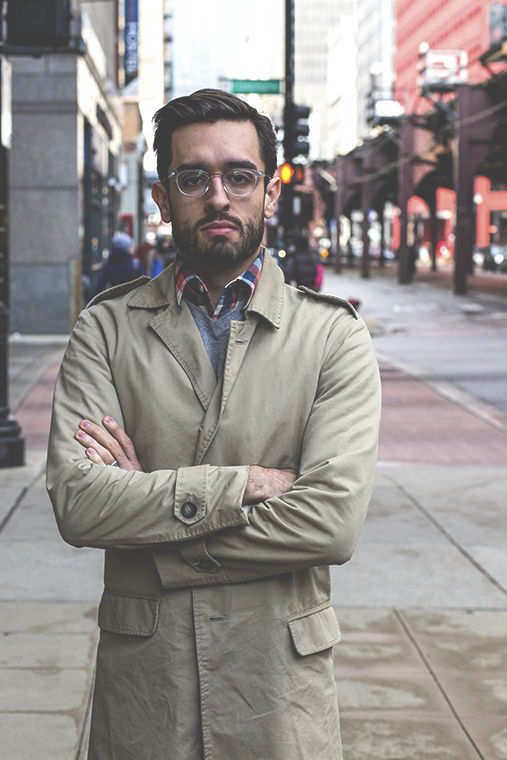Notable Native: Brandon Smith
Evan Bell Photo Editor
Brandon Smith is the independent journalist who sued to get the video of Laquan McDonald’s death to the general public.
December 7, 2015
The Nov. 24 video release of Laquan McDonald being fatally shot 16 times on Oct. 20, 2014, by a Chicago police officer was controversial given its graphic content, but to Brandon Smith, a journalist who filed the Freedom of Information Act request that led to the court-ordered release, it was important to show the public.
Smith began his journalism career in 2007 working as an editorial assistant at the Washington Court House Record-Herald in Ohio where he reported and photographed breaking news stories. In 2009, he moved to Chicago to study journalism at Columbia, where he worked for The Chronicle as an assistant sports & health editor for a semester and a half before leaving the college in 2011 because, as he said, “it was clear I didn’t need it.”
The Chronicle spoke with Smith about investigative journalism, large organizations’ approaches to journalism and his goals as an independent journalist.
THE CHRONICLE: Why is investigative journalism important to you?
BRANDON SMITH: [Muckrakery] is my Twitter handle. I want to advance the pursuit of investigative journalism as opposed to daily news grind bulls–t. To me, muckraking is like investigative journalism where you’re a watchdog, being antagonistic to authority, not taking it at face value and realizing everyone has an agenda. The job of a muckraker is to look out for the public, so that’s what I try to do.
Why did you file the FOIA request to gain access to the video of Laquan McDonald’s death?
BRANDON SMITH: I was put in touch with an activist, William Calloway, who suggested I look into this and [said] the denial of everyone’s FOIA requests would probably not stand up in court. He and I got together [and] filed a request, [which] took a couple months, and they eventually denied us. At that point we had standing to sue, which we did and we won.
What was most challenging about getting the video released to the public?
It wasn’t that difficult. Fourteen other news organizations before me filed this FOIA [request], were denied and refused to pursue it. I think the fact that it was pretty easy is really damning to the profession of journalism. These big organizations had the money to file this complaint. There were other reasons massive news organizations chose not to pursue it. It’s been well-documented [that] if you are close to one of your sources and have to talk to them a lot in pursuit of your story, you are reluctant to give them the middle finger. The question we should be asking is: Are our mainstream organizations too close, and are they afraid to rock the boat?
What are your thoughts about Chicago Police Superintendent Garry McCarthy being fired and its effect on the city?
The question on everyone’s minds is whether or not McCarthy’s ouster is a political move or whether it indicates a change in the direction of the [CPD]. It certainly could, but it’s yet to be seen. Reporters are hopefully going to keep a closer watch on the police department from now on and try to hold [Mayor Rahm Emanuel] accountable for the changes he’s said he’s got to make. Rahm came out with some strong language at the press conference the other day. He admitted there were really systemic problems, which is kind of cool, [and] this pretty much forced him to do that, because everyone, myself included, has been writing that he hasn’t even spoken about these systemic problems.
What do you think should be done next?
I think firing McCarthy is not necessarily a bold move. I think a bold move that would actually allow the public’s trust in the police and city to be restored would be something that I’m calling for, which [is] releasing every document related to Laquan.
What advice do you have for aspiring investigative journalists?
Read a lot of news about issues you think are important, and then file a ton of FOIA requests about all the issues these articles raise. Eventually, one of those is going to result in something cool and you’ll get a break.
Would you rather work independently or join a news organization?
I would much rather have the regular paycheck. The question becomes: Can I obtain that while doing the work that is necessary to my soul? I’m asking around at news organizations and probably what I’ll do is take an offer if I get it. If they ask me to suppress a story or not go down a road I feel should be gone down, I’ll just find somewhere else to go. I’m going to do what I like to do and what I think needs to be done.
What are your goals as an independent journalist?
I don’t want to be the next Glenn Greenwald, but it would be nice to work with whistleblowers where FOIA doesn’t cut it. Journalism is for the public good and in the public interest. If I can make a difference, that’s what I’ll do. Some professors say that’s an activist frame of mind, [but] you’re a human and [if] you want readers to trust you, you have to be a human.








